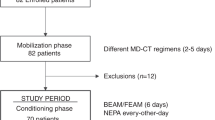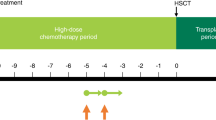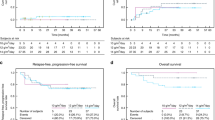Abstract
The purpose of the study was to assess the toxicity and efficacy of an oral, combination antiemetic regimen including granisetron (Kytril; SmithKline Beecham Pharmaceuticals, Philadelphia, PA, USA) in the setting of highly emetogenic conditioning chemotherapy for stem cell transplantation. Antiemetic prophylaxis consisted of oral granisetron 2 mg once daily, oral prochlorperazine 10 mg q 6 h and oral dexamethasone 4 mg q 6 h, beginning 1 h prior to chemotherapy on each of the 4 days of chemotherapy and continuing until 24 h after the completion of high-dose chemotherapy (HDC). Patients received either CVP (cyclophosphamide 6 g/m2, VP-16 1800 mg/m2 and carboplatin 1200 mg/m2) or CTP (thiotepa 500 mg/m2 in place of VP-16) in four daily doses given over 4 h from days −4 to −1. Previously mobilized and cryopreserved peripheral blood stem cells (PBSC) were reinfused on day +1. Evaluation of nausea, emetic episodes (EE), adverse events, and rescue medications were recorded on a daily patient diary. Thirty-six patients were entered. Fifty-three percent (95% CI = 37–75%) of patients achieved complete response for emesis (CR = 0 EE/24 h) and 75% (95% CI = 58–90%) had combined complete and major response (CR + MR = 0–3 EE/24 h) during all 5 of the treatment days. During the 5 study days, the average number of patient-days with no emesis was 3.7 (74%) and with 1–3 EE was 4.3 (86%). On days −4, −3, −2, −1 and 0, the combined CR + MR rate for emesis was 97, 92, 86, 78 and 75%, respectively. Nausea was absent or mild on all 5 study days in 57% (95% CI = 37–75%). Eight patients had severe late-onset emesis occurring on days +1 to +3 after reinfusion of stem cells. No clinically significant toxicities attributable to the antiemetic regimen were observed. An all oral antiemetic regimen of granisetron, prochlorperazine and dexamethasone appears to be safe and highly effective in patients receiving multiple, daily, high-dose chemotherapy regimens. This regimen offers the advantage of cost-savings, a low side-effect profile and ease of administration in the predominately outpatient setting of HDC with peripheral blood stem cell transplant (PBSCT).
This is a preview of subscription content, access via your institution
Access options
Subscribe to this journal
Receive 12 print issues and online access
$259.00 per year
only $21.58 per issue
Buy this article
- Purchase on Springer Link
- Instant access to full article PDF
Prices may be subject to local taxes which are calculated during checkout
Similar content being viewed by others
Author information
Authors and Affiliations
Rights and permissions
About this article
Cite this article
Frakes, L., Brehm, T., Kosty, M. et al. An all oral antiemetic regimen for patients undergoing high-dose chemotherapy with peripheral blood stem cell transplant. Bone Marrow Transplant 20, 473–478 (1997). https://doi.org/10.1038/sj.bmt.1700911
Received:
Accepted:
Issue Date:
DOI: https://doi.org/10.1038/sj.bmt.1700911
Keywords
This article is cited by
-
Antiemetic Strategies in Patients Who Undergo Hematopoietic Stem Cell Transplantation
Clinical Hematology International (2022)
-
The burden of chemotherapy-induced nausea and vomiting in children receiving hematopoietic stem cell transplantation conditioning: a prospective study
Bone Marrow Transplantation (2017)
-
The NK-1 receptor-antagonist aprepitant in high-dose chemotherapy (highdose melphalan and high-dose T-ICE: paclitaxel, ifosfamide, carboplatin, etoposide): efficacy and safety of a triple antiemetic combination
Bone Marrow Transplantation (2011)
-
Nausea and vomiting with high-dose chemotherapy and stem cell rescue therapy: a review of antiemetic regimens
Bone Marrow Transplantation (2008)
-
Ernährung, Lebensweise, Aktivitäten und supportive Maßnahmen unter chemotherapeutischer Behandlung
Der Urologe (2006)



